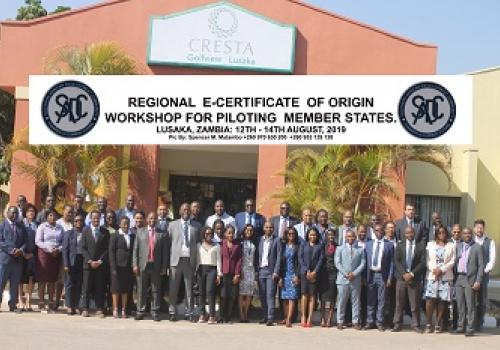Challenges which traders and customs officials have been facing in using the manual Certificate of Origin (CoO) in the Southern African Development Community (SADC) will be resolved as soon as the SADC Electronic Certificate of Origin (e-CoO) becomes operational. The SADC e-Certificate of Origin Framework was approved by the Committee of Ministers of Trade in 2019. The Framework will help to facilitate the application of the CoO electronically, thus easing cross-border trade in SADC. This will result in the smooth movement of goods across the Region to end consumers.
Intra-SADC regional trade is being slowed down by delays and other involved costs in the manual processing of the CoO from start to end, contributing to the total negative effect on trade. As one of the key focus areas for the SADC Trade Facilitation Programme (TFP), the e-CoO will increase the seamless flow of intra-trade across the Region by eliminating impediments caused by the manual process.
The implementation of the eCoO is supported by funds provided under the EU-SADC TFP. The programme is sponsored by the European Union (EU) to the tune of €15 million and its overall objective is to enhance inclusive economic development in the SADC Region through deepening regional economic integration and increasing intra-regional trade, In addition, the eCoO is also supported by GIZ-Cooperation for the Enhancement of the SADC Regional Economic Integration (CESARE) Programme).
The e-CoO will also greatly improve the quality of intra-regional trade data resulting in statistical analysis that can be used in making key managerial decisions, and improved competition by regional producers/exports. The e-CoO will further greatly reduce fraud and hence gives the traders fair competition across the market.
SADC, in its quest to simplify trade and ensure there is a smooth flow of goods and services across the Region, is building capacity and raising awareness among customs officials and stakeholders on the regional framework of the e-CoO across the Region.
Implementation of the eCoO is expected to contribute to the reduction of non-tariff barriers to trade and enhance participation of SADC Member States in the regional value chain and ultimately, support successful implementation of the SADC Industrialisation Strategy and Roadmap (2015-2063) in the consolidation of the SADC FTA. For the implementation of the e-CoO concept regionally, the Regional eCoO Framework will facilitate to harmonise the process of automation for registration, issuance, approval and transmission of the CoO.
The Framework is now being piloted in Eswatini, Malawi and Zambia. Work is on-going for the Framework to be piloted in Botswana, Lesotho, Mauritius, Mozambique, Namibia, South Africa, United Republic of Tanzania and Zimbabwe.
The SADC CoO has over the years been processed manually by the issuing authority in the country of origin of the goods, according to the rules contained in the SADC Protocol on Trade concerning the rules of origin for products to be traded between Member States.
This procedure is, however, cumbersome as it requires traders to go physically to the offices of the authority responsible for the issuance of the CoO in order to lodge the relevant application and obtain response on the issuance of the certificate. Once the issuing authority has verified that goods declared by the exporter conform to SADC rules, the CoO is then transmitted to the country of import.
Implementation of the e-CoO will therefore simplify this process, since it will allow the trader to apply on-line, trace the application and get the response on the submission through the same platform. Customs authority of the importing country will verify online the e-CoO authenticity, without the need to receive the original paper-based certificate.
The eCoO will reduce the time taken to process application and insurance since it will allow the trader to apply on-line, trace the application and get the response on the submission through the same platform. A reference number will be issued for the purpose of process customs declaration at the country of exportation.
The eCoO systems is equipped with security features such as online e-CoO authenticity verification, optical watermarking technology to distinguish between original and copies of CoOs issued. The e-CoO is being considered under the SADC Free Trade Area (FTA) whose objectives are to further liberalise intra-regional trade in goods and services; ensure efficient production; contribute towards the improvement of the climate for domestic, cross-border and foreign investment; and enhance economic development, diversification and industrialisation of the Region. Currently preparation for launching of the SADC eCoO is underway for July 2022 and it is expected that all Member States will implement the eCoO by 2024.

